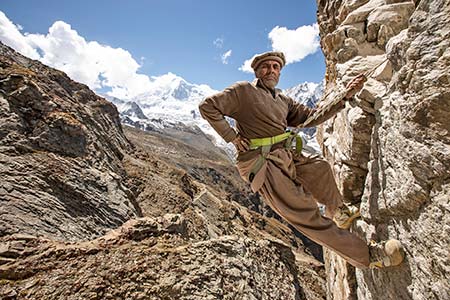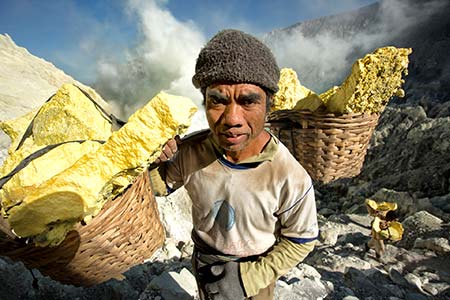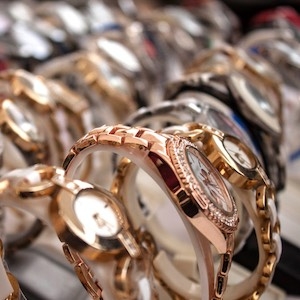
On JCK’s New Year’s podcast, I said my 2022 resolution was to talk to more people I disagree with. When I first got in touch with Australian photographer Hugh Brown (pictured at left)—who specializes in taking pictures of artisanal miners—I didn’t think he’d be one of them. But after a long discussion, excerpted here, I decided his skeptical take on “responsible sourcing” was worth printing, even if I didn’t always agree with what he had to say.
I’ll offer some thoughts at the end, but for now, let’s hear from Hugh Brown:
JCK: How did you get interested in this topic?
Hugh Brown: I was in Ghana, doing some work for a longtime client, when I saw these miners by the roadside, and I was pretty fascinated. It reminded me of these gold rushes in the developed world back in the 1850s.
Then I traveled more and saw more of these miners, and again I was fascinated. I can’t remember how many countries I had been to, but by mid-2010 I decided I’d love to do a book on the subject.
And you’re working on that book now?
Yes. The book intends to show the diversity of the commodities involved, the diversity of topography, the diversity of culture, the diversity of race, and the diversity of geography. I want to show how varied and complex this industry is, and how there is no one-size-fits-all solution for the artisanal miners.
There are a lot of people sticking their noses into the artisanal miners’ world. Imagine if they came from the Third World into our world and said that we could and should be doing things better. We would tell them to bugger off really quickly. We would ask them what the hell do they know?
We have plenty of solution finders, and most of them give no thought to the effect of their solutions downstream. What happens if they result in the displacement of artisanal miners from their livelihoods? That is not okay.
When you complain about people with solutions, are you talking about nongovernmental organizations (NGOs)?
NGOs are a part of it, but I’m talking big companies, developed world governments. I am talking about solutions—whether that be responsible sourcing formalizations, blockchain, all of these things that have been kicked around—which have long-term implications for the utilization of labor.
These solutions start to foster a transition to large-scale miners from small-scale miners. You have millions of artisanal miners, about 40 million. If you lessen the share of what is mined artisanally, a lot of them are going to lose their jobs. The question is, where do these people go? What do they do?
Formalization or legalization ties these artisanal miners up in knots. This push for responsible sourcing is coming with diminished mineral availability in the First World. They are looking at the Third World. I don’t think that’s a coincidence.
What do you think about projects like Fairmined and Moyo Gems and GemFair, which develop special products unearthed by artisanal miners?
I’m sure some of these projects are working. I have heard good things about some of them. But they are tinkering around the edges. They are a small percentage of the bigger picture.
If you were to scale these projects, I have no doubt that the end result would be the displacement of labor, and then you are back on the same merry-go-round.
What about artisanal situations with bad safety standards? Isn’t it right to say we don’t want people risking their lives for the products we buy?
That’s a difficult question. You are trying to overlay Western values on the Third World. Most of the people I come across in artisanal mining make the active choice to do it. Is it right for us to turn around and say, “You can’t make a living, it’s not safe”?
The conditions don’t worry me. Artisanal miners have a sense of their own safety. There will always be a portion that push the envelope to try and extract more money. But at the end of the day, any system of improvement must be self-perpetuating and sustainable, and not reliant on some First World consultant overseeing its implementation and operation.

You also often hear: “Wouldn’t these people be better off doing agricultural work?”
There are always activities in the village fields and the farms. People say we need to be creating alternative industries in these countries. If I went to you and said, “You guys shouldn’t be working at what you’re doing,” you would tell me to jump in the lake. These people are earning two to three times with mining than what they would otherwise.
If we are really looking at creating alternative industries, that requires investment from First World countries. But when all is said and done, people in the developed world don’t care about people in the Third World.
What about the environmental damage some of the miners cause?
There are clearly environmental issues with some artisanal mining. But no one dares to talk about [the damage caused by] large-scale miners.
Child labor is an interesting one too. It gets a lot of attention in the developed world press. A lot of parents have children [work] because it’s the only way their kids are going to eat and survive.

You say the Western world shouldn’t get involved, but aren’t we involved already? Often the markets in these countries are controlled by a small group that doesn’t give the workers fair value for their labor. And then Western businesspeople work with that group.
It’s a really difficult question. You can extrapolate that to almost any market. And that includes the First World. There are First World monopolies and oligopolies in almost every major industry.
But that’s not to say there aren’t people getting shafted in the artisanal mines. Clearly there are. But that’s not an issue unique to the Third World.
What should people be looking for when they’re buying items?
The problem is, to source properly, you need close to perfect information. When you are sourcing with imperfect information, it’s hard to mount an argument: Is this gold responsibly sourced if I don’t know where it’s from?
It’s not possible for a consumer in the developed world to make a meaningful assessment. One of the issues I have with responsible sourcing advocates is they seek to standardize something that can’t be standardized. You have 100 people who have 100 different answers from the start. It’s almost an illusory goal. How is someone who is sitting in New York going to make an assessment of whether something is responsibly sourced? Even if you know where a product is coming from, it can take many years of being on the ground to peel through all the layers of the onion.
I don’t want people to look at the pictures in my book and think, “That’s horrible.” I want people to understand there are so many elements to artisanal mining. It isn’t all child labor or organized crime. You have to look at the flip side. There are 40 million people [working artisanally] against 7 million people in large-scale mining, which is 90% of the global output.
Most of the money that artisanal miners make stays in the country, and then you have the multiplier effect of that money. A lot of it provides upward mobility. The miners get a lot of skills they wouldn’t otherwise get. It’s a massive development engine in the Third World.
The other important point is there is no clear objective as to what success looks like in this space. And you have so many people involved in the mix. You have millions of different people having to agree on things.
One of the big moments for me was when an interviewer asked me, “What are we trying to accomplish here?” And I had no idea.
I also had to tell him that I was sorry and had no idea how to buy a responsibly sourced mineral. And if I don’t know what responsible means after 16 years in the sector, what hope has a consumer or jeweler or wholesaler got?
Let me offer a few thoughts of my own:
I agree that there is no one-size-fits-all solution to artisanal mining, but I don’t think anyone expects one. It’s very difficult to solve anything in this world. What you want is “continuous improvement”—so standards are always raised in certain areas, with initiatives like mercury-free gold mining.
In addition, true “responsible sourcing” doesn’t necessarily involve cutting out artisanal miners; in most cases—certainly in this industry—there is an explicit effort to not do that. Responsible sourcing also involves protecting artisanal miners from violence.
This movement is still relatively new. It will inevitably make mistakes and at times seem like it’s not making progress; we’re dealing with huge problems here, and giving for-profit companies the burden of solving them may not always be the best idea. That said, I’d wait before pronouncing it worthless (as Brown has). That could breed complacency.
I also don’t necessarily buy the idea that this movement is an effort by Western elites to take over Third World resources. The law most injurious to artisanal miners—the conflict minerals provision of the Dodd-Frank Wall Street Reform and Consumer Protection Act—was inserted by NGO-friendly representatives at the last minute, without anyone seemingly grasping its implications.
That said, Brown makes some thought-provoking points. The world is more connected now, which brings us closer to the people that dig up our materials. They are some of the poorest people on Earth. It would be a crime to ruin their livelihoods, particularly in the name of “responsibility.”
Artisanal miners must be a part of the current sourcing conversation. Let’s make sure we don’t just talk at them, but with them.
If you want to support Brown’s work, go here. He also opines a lot on LinkedIn. And feel free to offer your thoughts below.
(All photos courtesy of Hugh Brown)
Follow JCK on Instagram: @jckmagazineFollow JCK on Twitter: @jckmagazine
Follow JCK on Facebook: @jckmagazine





